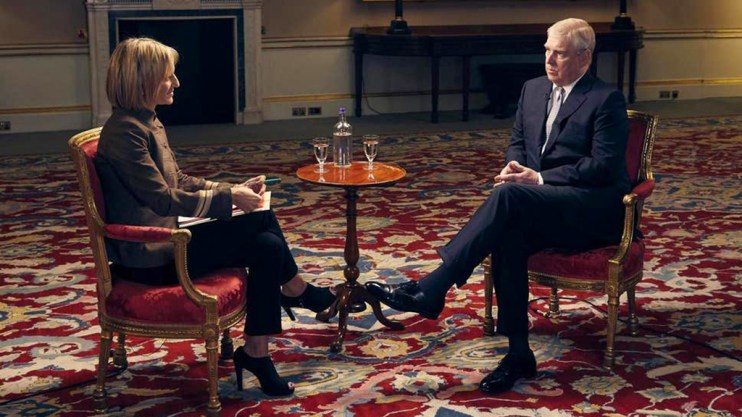You say it best when you say nothing at all

It’s very rare to see a full-dress, one-on-one interview with a senior member of the Royal Family. Part of the deal of Bagehot’s not letting daylight in on magic is that the royals are seen rather than heard, totemic mannequins to be deployed for ceremonial events which require that little bit of uniquely British stardust. If you watched the BBC’s interview with the Duke of York on Saturday evening, you’ll see why.
Since the arrest and subsequent death of financier, socialite and convicted sex offender Jeffrey Epstein, there has been a great deal of media attention focused on his friendship with Prince Andrew. Even for a royal with Andrew’s – ahem – racy reputation, this was a strange and high-risk liaison which began back in 1999.
Epstein was well-connected and wealthy with luxurious homes scattered across the US and the wider world, he was also a convicted abuser and child rapist, against whom federal authorities had accusations from more than 30 women. While no one has claimed that the royal bulb burns anything but dimly, even he should have heard warning bells sounding. Honestly, not one advisor even thought to tell him that associating with Epstein was a bad idea?
Buckingham Palace’s first public reaction was to issue a rather bad press release after the story broke in an attempt to put some distance between the prince and the convicted sex offender. I hate press releases at the best of times, but this one was particularly inept, released on a Saturday afternoon (basic fail) and apparently washing the royal hands of the matter by saying that he had not “seen [or] witnessed” Epstein’s wrongdoings. So that’s all right then? It surprised literally no-one that the press release did nothing to damp down the fire, and so began a chain of events which ended in Saturday night’s television interview.
It was, as everyone now knows, a public relations disaster. I’ve never seen a more public self-immolation in 20 years in the business, and if Andrew was briefed and trained for the questioning, it didn’t show. In an hour, he made passing reference to Epstein’s victims only once: there was no general expression of sympathy or support for them, nor understanding of what they’d been through.
The alibis came think and fast: He and Epstein weren’t really good friends, the relationship was more with the latter’s girlfriend, Ghislaine Maxwell; Andrew had stayed at Epstein’s homes out of convenience more than anything else; he had been (a killer phrase, this) “too honourable” in not ending the friendship earlier. He couldn’t sweat.
Playing down sexual abuse and seeming concerned only with his own reputation and any mud that might cling was the centrepiece of the catastrophe, certainly. But there was also a pervasive sense of superiority, of being out of touch, of living a gilded existence unsullied by the concerns of the ordinary people.
When the brilliant Emily Maitlis suggested that Epstein had been invited to a birthday party by the Duke of York, Andrew seemed horrified. “No!” he exclaimed. (At this point I waited for the denial, which never came.) “Just a straightforward shooting party.” Maitlis, like me Yorkshire by birth, had committed the terrible solecism of muddling up her parties. Proof positive that we are both firmly below the salt. Then came the pièce de resistance, the excuse that launched a thousand memes, and which set Twitter ablaze. Andrew could not possibly have been partying with Virginia Roberts Giuffre because he had an alibi that evening: he had been at Pizza Express in Woking celebrating his daughter’s birthday. That admission seemed to pain him more than anything else throughout the interview.
Today, The Queen, who amazingly gave the go-ahead for the interview – stands by her errant son. But did the interview help Andrew’s public reputation in any way at all? Why did he do it?
Taking the second point first, the immediate reasons are as yet unknown. We do know that the prince’s press secretary, Jason Stein, hired in September, left after only a few weeks to join a PR firm. It is rumoured that there were disagreements over media strategy in general, and the interview in particular. It is further whispered that the interview was recommended by Andrew’s private secretary, Amanda Thirsk, a banker by trade and a lawyer by training, who saw an opportunity to draw a line under the Epstein affair and who, it is alleged, does not see that the prince did anything wrong. Thirsk has been with Andrew for several years, and has his ear; her bold proposal may have caught his imagination, and offered him a panacea—do this one uncomfortable and unpleasant thing, and your troubles are at an end. Sir.
Finally, the effect. I’ve seen no one who thinks that Andrew’s reputation has come out enhanced, or even that the rot has been stopped. On the contrary, there have been more questions raised than answered about the prince’s relationship with Epstein and whether or not he did have any kind of contact with Ms Roberts Giuffre, setting aside for a moment the question of whether he is guilty of a formal offence.
Certainly, he has been made to look ridiculous. In many ways, this is the worst fate for a jobbing royal. If anything comes of the allegations against him, his public career will surely be finished. The Outward Bound, the Royal Fine Art Commission, RUSI, Pitch@Palace… all of this will have to come to an end. As, of course, it should.
We are not yet at the stage of criminal proceedings. That stage may never come. But perhaps the Duke of York should have borne in mind the policeman’s well-worn words, “You have the right to remain silent.” Sometimes it’s for your own good.